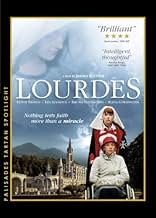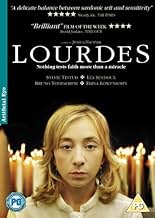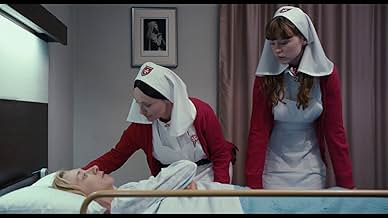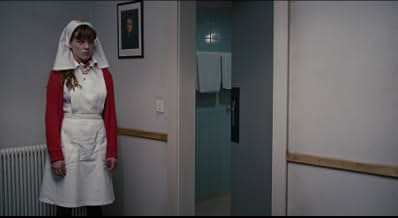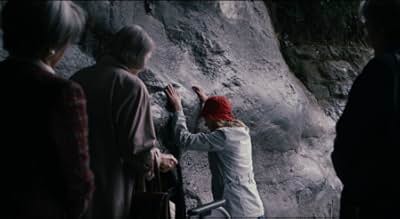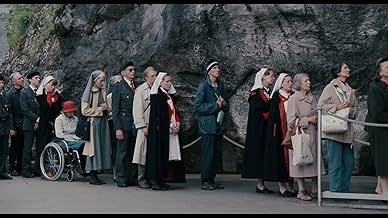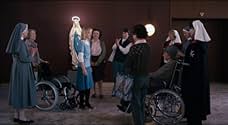VALUTAZIONE IMDb
6,9/10
3879
LA TUA VALUTAZIONE
Aggiungi una trama nella tua linguaIn order to escape her isolation, wheelchair-bound Christine makes a life changing journey to Lourdes, the iconic site of pilgrimage in the Pyrenees Mountains.In order to escape her isolation, wheelchair-bound Christine makes a life changing journey to Lourdes, the iconic site of pilgrimage in the Pyrenees Mountains.In order to escape her isolation, wheelchair-bound Christine makes a life changing journey to Lourdes, the iconic site of pilgrimage in the Pyrenees Mountains.
- Premi
- 12 vittorie e 7 candidature totali
Orsolya Tóth
- Child in Wheelchair
- (as Orsi Tóth)
Gerith Holzinger
- Malteserin
- (as Gerith Alice Holzinger)
Recensioni in evidenza
That was George Martin's description of Lennon and Maccartney's songwriting partnership: Maccartney provided the olive oil, and Lennon the vinegar. The balance is just as perfect in this movie, which manages to capture the temple of crass which is Lourdes, without ridiculing the faith that leads people to revere it. It is a quiet movie, with little dialogue, and frequent recurring motifs—religious services, visits to the grotto, Lourdes water in ghastly containers. The little cast of characters is superb, and there are no weak performances here.
If I had one criticism, it's that the movie is sometimes too subtle for its own good. Occasionally, I like to be told what I'm watching and why it's significant. Perhaps this is my own crudeness. Nevertheless a brilliant movie, that made me chuckle and yet moved me.
If I had one criticism, it's that the movie is sometimes too subtle for its own good. Occasionally, I like to be told what I'm watching and why it's significant. Perhaps this is my own crudeness. Nevertheless a brilliant movie, that made me chuckle and yet moved me.
I am Roman Catholic. Lourdes is a blessed, mystical place. I hear. The story goes, the Virgin Mary appeared to St. Bernadette in a grotto near Lourdes several times. Word spread, a shrine was built, miracles occurred, all in this small community in the south of France. Now, millions travel to Lourdes every year, looking for intervention from St. Bernadette and the Blessed Mother. While I've never been there, I have been to shrines, like Saint Joseph's Oratory of Mount-Royal in Montreal. The relics for sale and presence of the pilgrims are a little scary, but there was no denying the power of the place. So, I was very interested to see a pilgrimage from the perspective of a pilgrim in Lourdes, a movie playing at the Cleveland International Film Festival, this week. Christine is a young woman from France who has multiple sclerosis. She's lost control of her body from the neck down. But, her mind is vibrant, she seems to accept the help of nurse volunteers at Lourdes with a pleasant demeanor. She tells a priest, in confession, that she gets angry over her diagnosis and feels envious of able bodied people, like a nurse who is flirting with a man on the trip that she fancies. This is like a group tour, with a different activity each day: a hike through the grotto, a bath in the water, even an award at the end of the trip for the "Best Pilgrim." Christine's mother is with her on the trip. Their relationship is one of the things that bothered me in the movie. While her mother accepts the role of caregiver, they barely talk or interact, except in a very distant fashion. I didn't get that. A couple of the older volunteers hang together at night and discuss deep topics of faith and spirituality. Juxtapose that with Christine confessing to her nurse that she is not really a believer, she just goes on the pilgrimages because she can't really get out of the house for much else. When the inevitable miracle occurs, within the group, some are jealous, others are skeptical, others just wonder why some are chosen and others are not. Lourdes is a very quiet, very slow moving film. I guess I was hoping for more of an epiphany, but at the end, I wasn't at all sure what I was supposed to take away from it. I was interested but not satisfied. I give Lourdes a 7 out of 10.
Christine (Sylvie Testud) is wheelchair-bound, and is suffering from multiple sclerosis. She travels to the pilgrimage site of Lourdes in the Pyrenees Mountains to both escape from her isolation, and seek some kind of answers to her situation. Compared to the other pilgrims, Christine has little faith in God. Yet while she's there, she miraculously gains controls of her limbs and she rises from her wheelchair. The church are quick to jump on it as a 'miracle', but seek medical advice in order to confirm this.
The film never takes a stance in regards to its attitude to either religion or spirituality, to the point where the 'miracle' that takes place takes a backseat. This is a film that is more concerned with its characters' plight, and how the people around Christine react to the possible miracle that they witness. It does, if anything, portray the Catholic faith in a positive light. The priest seeks all the medical advice he can get before he will believe it as a miracle, and the helpers at Lourdes (minus one rather self-involved girl) are shown to have genuine love for the work they do, and its importance. But it does also show the slightly ridiculous side, as the Church will only recognise it as an 'official' miracle if it ticks certain boxes.
it does not linger on the idea of faith, as previously stated, but instead how it corrupts, bewilders, and enchants the people around Christine. Some of the pilgrims talk bitterly between themselves and doubt her sincerity, to the point where they begin to dismiss the idea of miracles, which is the very thing that they went to Lourdes to experience. One of the male helpers initially shows an interest in Christine, glancing and smiling at her every now and then. Yet when she begins to walk again, he seems to almost completely fall for her, much to the jealousy of one of the female workers. It's a startling commentary on how humanity can be corrupted and influenced by the idea of religion.
Lourdes is a quiet, gentle and ponderous portrayal of a woman desperately seeking an answer to her illness and finding it in the last place she would expect. It doesn't force its ideas down your throat, but instead it lets it flow across the small interactions and expressions of its characters. The pace may sometimes come to a standstill, but this is a richly rewarding experience from one of Austria's most exciting new directors.
www.the-wrath-of-blog.blogspot.com
The film never takes a stance in regards to its attitude to either religion or spirituality, to the point where the 'miracle' that takes place takes a backseat. This is a film that is more concerned with its characters' plight, and how the people around Christine react to the possible miracle that they witness. It does, if anything, portray the Catholic faith in a positive light. The priest seeks all the medical advice he can get before he will believe it as a miracle, and the helpers at Lourdes (minus one rather self-involved girl) are shown to have genuine love for the work they do, and its importance. But it does also show the slightly ridiculous side, as the Church will only recognise it as an 'official' miracle if it ticks certain boxes.
it does not linger on the idea of faith, as previously stated, but instead how it corrupts, bewilders, and enchants the people around Christine. Some of the pilgrims talk bitterly between themselves and doubt her sincerity, to the point where they begin to dismiss the idea of miracles, which is the very thing that they went to Lourdes to experience. One of the male helpers initially shows an interest in Christine, glancing and smiling at her every now and then. Yet when she begins to walk again, he seems to almost completely fall for her, much to the jealousy of one of the female workers. It's a startling commentary on how humanity can be corrupted and influenced by the idea of religion.
Lourdes is a quiet, gentle and ponderous portrayal of a woman desperately seeking an answer to her illness and finding it in the last place she would expect. It doesn't force its ideas down your throat, but instead it lets it flow across the small interactions and expressions of its characters. The pace may sometimes come to a standstill, but this is a richly rewarding experience from one of Austria's most exciting new directors.
www.the-wrath-of-blog.blogspot.com
Lourdes is a famous Catholic shrine in France, visited by pilgrims from around the world seeking miraculous cures for serious medical conditions.
Christine(Sylvie Testud) is wheelchair bound due to multiple sclerosis. Although not deeply religious, she decides to try to be healed by divine intervention. After a few days, she slowly is able to get up and walk. Other visitors with much more faith than Christine have philosophical debates on the fairness of it all.
She meets a man while apparently making progress physically, but the budding romance fizzles quickly when the guy proves to be unable to accept her limitations.
A night view of the city with only the faithful holding up candles while Ave Maria plays in the background is simply breathtaking. I am not personally religious, but I grew up Catholic and can appreciate the beauty of the symbolism and message. Jessica Hausner does not preach to the audience at any point, but gives us the opportunity to make up our own minds about faith and belief in miracles. Lourdes is an interesting conversation starter and a good movie.
Christine(Sylvie Testud) is wheelchair bound due to multiple sclerosis. Although not deeply religious, she decides to try to be healed by divine intervention. After a few days, she slowly is able to get up and walk. Other visitors with much more faith than Christine have philosophical debates on the fairness of it all.
She meets a man while apparently making progress physically, but the budding romance fizzles quickly when the guy proves to be unable to accept her limitations.
A night view of the city with only the faithful holding up candles while Ave Maria plays in the background is simply breathtaking. I am not personally religious, but I grew up Catholic and can appreciate the beauty of the symbolism and message. Jessica Hausner does not preach to the audience at any point, but gives us the opportunity to make up our own minds about faith and belief in miracles. Lourdes is an interesting conversation starter and a good movie.
Summary
Lourdes is a remarkable psychological and social x-ray of the world around the famous religious complex in the Pyrenees, with that clinical precision so typical of Austrian cinema and with a delicate balance in which hints of irony always give way to respect and piety. The film achieves moments of an absolutely human, moving religiosity, such as I have rarely seen in a film.
Review:
Jessica Hausner's film follows Christine, a motor disabled person, during her journey through the famous tourist-religious complex around the Lourdes Grotto in the French Pyrenees.
Multiple dimensions and themes run through this film. On the one hand, there is a look at the disease, the relationship between the healthy and the sick and how she considers the Catholic religion to the sick and the concept of healing, put into the mouths of their own priests.
On the other hand, Lourdes paints a picture of that touristic-religious universe viewed with that clinical precision so typical of Austrian cinema, with a delicate balance in which hints of irony always give way to respect and piety. It is difficult at first to place oneself in that world of patients, companions, relatives, nuns, priests and volunteers of the Order of Malta (where each one fulfills a precise, transitory or permanent function), where a sociogram is drawn where solidarity intersects , misgivings, hope, desire, jealousy, envy, frustration and, of course, faith, in a setting that is enriched with real shots of masses and mass movements in which the film leans into the documentary . They all follow a kind of procession (with something of a way of the cross) scheduled and methodical, waiting for the miracle of healing to take place.
Why do the sick go to Lourdes? Christine answers that question early in the film, and not exactly from a pious place. Sylvie Testud remarkably puts the body to her character and her evolution, accompanied by Maria (Lea Seydoux, in a rather small role), the companion who embodies health.
As we had already seen in the also notable Little Joe, Hausner beautifully frames her scenes preferably in fixed and geometric planes. Supported by a wonderful use of Bach's music, Lourdes achieves moments of an absolutely human, moving religiosity, such as I have rarely seen in a film.
Lourdes is a remarkable psychological and social x-ray of the world around the famous religious complex in the Pyrenees, with that clinical precision so typical of Austrian cinema and with a delicate balance in which hints of irony always give way to respect and piety. The film achieves moments of an absolutely human, moving religiosity, such as I have rarely seen in a film.
Review:
Jessica Hausner's film follows Christine, a motor disabled person, during her journey through the famous tourist-religious complex around the Lourdes Grotto in the French Pyrenees.
Multiple dimensions and themes run through this film. On the one hand, there is a look at the disease, the relationship between the healthy and the sick and how she considers the Catholic religion to the sick and the concept of healing, put into the mouths of their own priests.
On the other hand, Lourdes paints a picture of that touristic-religious universe viewed with that clinical precision so typical of Austrian cinema, with a delicate balance in which hints of irony always give way to respect and piety. It is difficult at first to place oneself in that world of patients, companions, relatives, nuns, priests and volunteers of the Order of Malta (where each one fulfills a precise, transitory or permanent function), where a sociogram is drawn where solidarity intersects , misgivings, hope, desire, jealousy, envy, frustration and, of course, faith, in a setting that is enriched with real shots of masses and mass movements in which the film leans into the documentary . They all follow a kind of procession (with something of a way of the cross) scheduled and methodical, waiting for the miracle of healing to take place.
Why do the sick go to Lourdes? Christine answers that question early in the film, and not exactly from a pious place. Sylvie Testud remarkably puts the body to her character and her evolution, accompanied by Maria (Lea Seydoux, in a rather small role), the companion who embodies health.
As we had already seen in the also notable Little Joe, Hausner beautifully frames her scenes preferably in fixed and geometric planes. Supported by a wonderful use of Bach's music, Lourdes achieves moments of an absolutely human, moving religiosity, such as I have rarely seen in a film.
Lo sapevi?
- QuizWhen the script for Lourdes (2009) first landed on Sylvie Testud's desk, her initial reaction was that she didn't want to do anything that might involve her playing a nun or taking easy potshots at religion. She instantly changed her mind after reading the script.
- ConnessioniFeatured in Women Make Film: A New Road Movie Through Cinema (2018)
I più visti
Accedi per valutare e creare un elenco di titoli salvati per ottenere consigli personalizzati
- How long is Lourdes?Powered by Alexa
Dettagli
- Data di uscita
- Paesi di origine
- Siti ufficiali
- Lingua
- Celebre anche come
- 奇蹟度假村
- Luoghi delle riprese
- Aziende produttrici
- Vedi altri crediti dell’azienda su IMDbPro
Botteghino
- Budget
- 2.000.000 € (previsto)
- Lordo in tutto il mondo
- 2.947.270 USD
- Tempo di esecuzione
- 1h 36min(96 min)
- Colore
- Mix di suoni
- Proporzioni
- 1.85 : 1
Contribuisci a questa pagina
Suggerisci una modifica o aggiungi i contenuti mancanti


